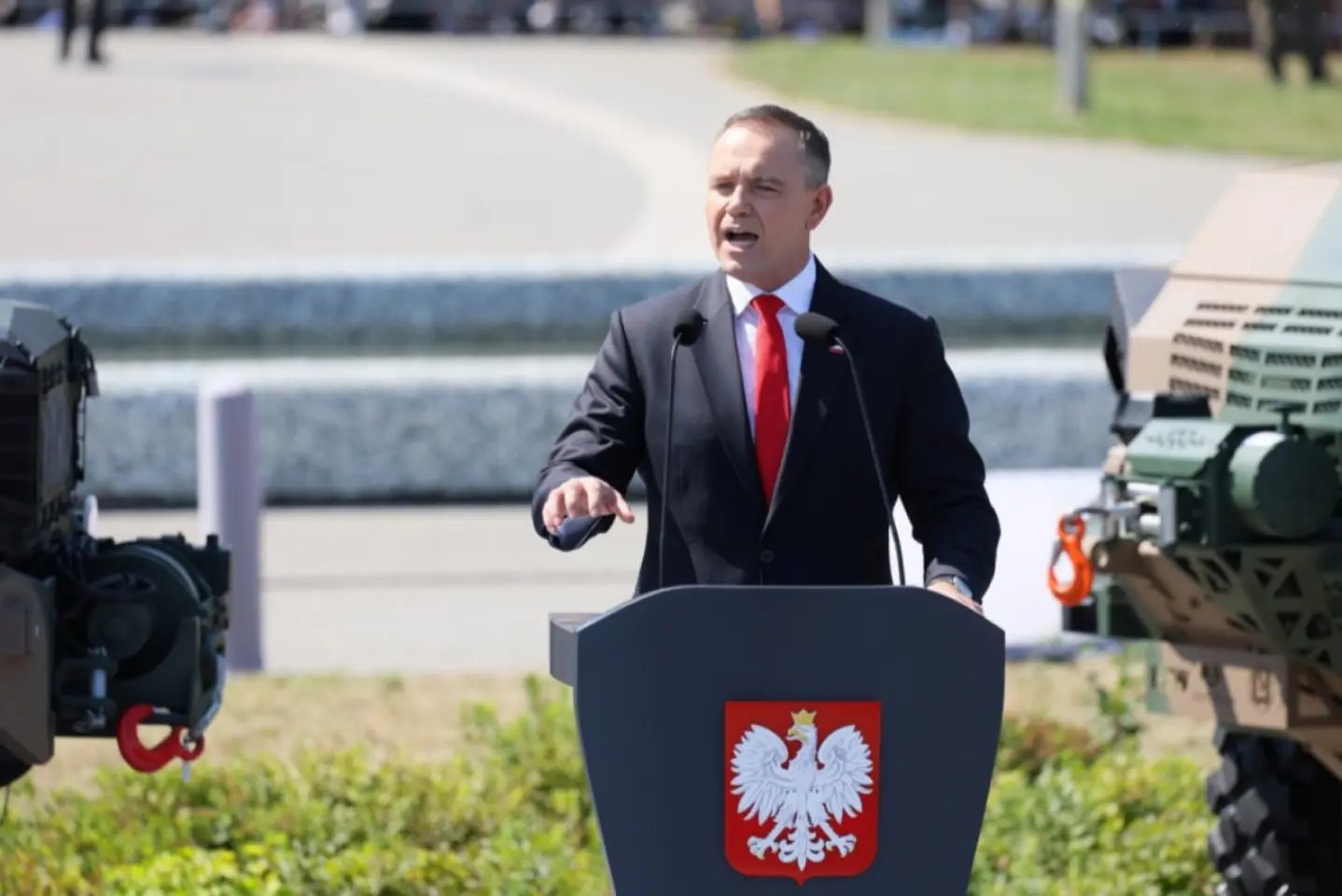
Karol Nawrocki took office this month promising to be a president of initiative, not passivity. In his very first speech to Parliament on Aug. 6, the historian-turned-politician drew a sharp line under the eight years of Andrzej Duda, his predecessor whose loyalty to the Law and Justice party had earned him a reputation as little more than a notary.
“I will not be the president of just one party, but of the entire nation,” Nawrocki declared, his voice rising over the chamber. “I want to be the voice of reason, stability, and proactive action.”
The words carried both symbolism and challenge. They were understood as a rebuke to Duda’s tenure, but also as an implicit promise to act as a counterweight to Donald Tusk’s centrist government. Within days, the new president’s agenda became clear: rather than serving as a ceremonial head of state, he would attempt to establish himself as an alternative center of political power.
“This is not a presidency of continuity — it is a presidency of breakthrough,” wrote Michał Szułdrzyński in Rzeczpospolita, capturing a mood that spread quickly across the political spectrum.
A Historian in the Palace
Few expected Karol Nawrocki to emerge as a political force. A trained historian and former head of the Institute of National Remembrance, he was known for his work on Poland’s 20th-century traumas and for his role in shaping the politics of memory. To supporters, he was a principled custodian of national history; to critics, a partisan scholar aligned with the nationalist right.
Now, suddenly, he was president. “It’s as if an actor in historical theater suddenly appeared in a political spectacle, the stakes of which are real, not symbolic,” observed Rafał Matyja, a political scientist, on TOK FM radio.
For Law and Justice, the party that had propelled him forward, Nawrocki represented both continuity and risk. He was ideologically loyal but not an insider of party politics. That gave him room to maneuver — and to surprise.
An Inaugural Address as a Battle Cry: Nawrocki Announces Several Initiatives
In his first appearance before Parliament, Nawrocki offered what sounded more like a prime ministerial exposé than a presidential inaugural. The speech was long on detail, outlining legislative initiatives rather than symbolic aspirations.
He promised a “Family Plus” tax program to support households with two or more children, pledged full backing for the Central Communication Port — an ambitious airport and rail hub outside Warsaw — and vowed to strengthen the military while keeping Poland close to the United States. He also announced initiatives in national remembrance and historical education, signaling that his past as a historian would shape his presidency.
The difference from 2015, when Andrzej Duda opened his tenure with vague promises of listening to citizens and defending families, could hardly have been clearer. “Duda began as a president dependent on the party,” said Anna Materska-Sosnowska, a political scientist quoted in Gazeta Wyborcza. “Nawrocki is beginning as a president who wants to be an independent political center.”
Right-leaning commentators praised the specificity. “Not only symbols, but also numbers, not only community, but also a program,” wrote Łukasz Warzecha in Do Rzeczy. “There was more substance here than in all of Duda’s inaugural addresses combined.”
Liberals, by contrast, warned that the president was declaring open competition with the government. “The presidency as a competitive government — that’s how you can summarize this statement,” wrote Michał Krzymowski in Newsweek Polska.
Professor Antoni Dudek, a political scientist, remarked on TVN24: “It was more of a prime minister’s exposé than a president’s. If anyone expected reconciliation, they were disappointed.”
First Decisions, First Confrontations
Karol Nawrocki moved quickly to back words with action. Within his first week, he submitted two bills to Parliament: one offering pro-family tax breaks, and an act on accelerating work on the Central Communication Port.
At the same time, he wielded the veto pen against Tusk’s government, blocking a wind farm bill intended to liberalize regulations and lower household energy costs. The president argued the measure posed risks to Poland’s energy security. “We cannot become dependent on sources that are unstable and vulnerable to weather whims,” he said at a news conference.
The government’s response was sharp. “This veto hurts Polish families waiting for cheaper electricity,” said Climate Minister Paulina Hennig-Kloska.
Commentators saw the clash as a portent. “The first week and the first veto — it’s symbolic,” said Michał Szułdrzyński. “Nawrocki clearly shows that he will filter the government’s projects through his own ideological lens.”
A Clash Over Poland’s Future
If one issue crystallized the emerging battle lines, it was the Central Communication Port (known by its Polish initials, CPK). Conceived by the Law and Justice government, the project envisions a vast air and rail hub intended to transform Poland into a Central European transport powerhouse. Estimated costs run into the tens of billions of euros.
After returning to power in 2023, Tusk questioned the plan, launching an audit and suggesting it might be scaled back or delayed. Nawrocki seized on the project as a symbol of national ambition. “CPK is not just an airport,” he said. “It is the driving force of Polish modernization.”
“This demonstrates two visions of the state,” said sociologist Jarosław Flis. “Tusk prioritizes pragmatism and counting every penny. Nawrocki thinks in terms of grand projects and symbols. For him, the CPK is a story about Poland with superpower ambitions.”
Many see the dispute as a harbinger of long-term conflict. “If the government blocks CPK, Nawrocki will make it the cornerstone of his presidency,” wrote Piotr Semka in Do Rzeczy. “He will claim to defend Polish ambition against Tusk’s small-minded pragmatism.”
Energy is another dividing line. The Tusk government, aligning with Brussels, wants to accelerate renewable energy. Mr. Nawrocki emphasizes coal, nuclear power, and sovereignty. Economists warn his veto could cost Poland EU funds and stall modernization. But supporters note his rhetoric resonates with conservative voters, especially in smaller towns and mining regions.
“The energy sector will become a test of who really rules in Poland,” wrote Adam Grzeszak in Polityka.
Two Foreign Policies
Perhaps most destabilizing is the risk of a double voice abroad. In his inaugural address, Karol Nawrocki stressed Poland’s role as a strong NATO ally and defender of Ukraine, but also as a sovereign nation wary of Brussels. The tone contrasted with Donald Tusk’s language of pragmatic partnership within the European Union.
The rivalry soon played out dramatically. Just before President Trump held talks with Vladimir Putin, Nawrocki’s office orchestrated Tusk’s exclusion from a joint conference call. Liberal commentators decried the move as undermining Poland’s credibility. “Never before have politicians, for reasons of ambition, attacked the dignity of the state on an issue as crucial as war on our neighbor,” wrote Bartosz Wieliński in Gazeta Wyborcza.
Karol Nawrocki then announced that his first foreign trip would be to Washington on Sept. 3 — a break with tradition, which typically sends Polish presidents first to Brussels, Berlin, or Paris. “Choosing America shows where his heart beats,” Rzeczpospolita noted. It also signals ideological alignment: closer to Washington than Brussels.
Security experts sounded alarms. “There is no room for double entendre in foreign policy,” warned Gen. Stanisław Koziej. “For NATO, it is crucial to know who speaks for Poland. Today, it is unclear: Tusk or Nawrocki.”
Polarized Reactions
The president’s activism has split Poland’s already polarized media landscape. On the right, enthusiasm abounds. “Nawrocki has shown that you can be an active president without hiding behind the party. This is a presidency that can rebuild national pride,” wrote Bronisław Wildstein. Others hailed his embrace of ambitious projects, contrasting it with Tusk’s cautious budgeting.
On the liberal side, warnings dominate. “From the very first days, Nawrocki has shown his ambition is not cooperation but building his own state within a state,” argued Bartosz Wieliński in Gazeta Wyborcza. “Poland cannot afford two foreign policies and two economic plans.”
Even among conservatives, doubts creep in. “If he vetoes everything, he risks becoming a president of chaos, not vision,” Semka cautioned.
An Experiment in Democracy
What makes Nawrocki’s presidency distinctive is his background. He is not a career politician but a historian who rose through a cultural institution. Some analysts describe his election as an “experiment in Polish democracy.”
“He is the first president in years not to emerge directly from a party base, but from an institution of memory,” wrote Agnieszka Haska in Tygodnik Powszechny. “This makes him unpredictable — both a guardian of values and a full-scale political player.”
For Law and Justice, which championed his candidacy, he was an ally who could carry forward aspects of their vision without being a party insider. But that independence cuts both ways. Already, commentators speculate he may seek to build his own political base, distinct from both Donald Tusk and his Law and Justice patrons.
“Paradoxically, Nawrocki may prove more independent than Duda,” suggested Michał Kobosko in Rzeczpospolita. “He is not as attached to the party. He may try to build his own agenda — and that could open space for a new style of presidency.”
The Risks Ahead
Poland has experienced cohabitation before, but rarely so confrontational, so early. “In the past, presidents and prime ministers were condemned to cooperation, even if they disliked each other,” wrote Piotr Mucharski in Tygodnik Powszechny. “Now we see something new: the president is immediately establishing himself as an alternative government.”
Whether this invigorates Polish democracy or paralyzes it remains to be seen. Optimists argue that rivalry could sharpen policy arguments. Pessimists warn of paralysis, especially on foreign and energy policy, where consistency is crucial.
“The most difficult thing in Polish politics is that everyone wants to talk, but no one wants to listen,” Piotr Mucharski added. “Perhaps the new president’s greatest challenge will be learning to listen — not only to himself, but to others.”
For now, what is clear is that Karol Nawrocki’s presidency will not fade into the background. In just weeks, he has positioned himself not as a ceremonial figurehead but as a rival power center. That promises an active, contentious, and perhaps dramatic chapter in Poland’s democracy.


